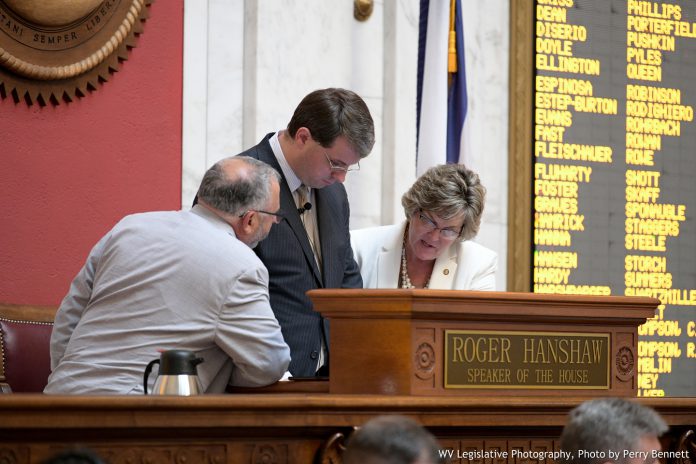The House took up an originating education bill, which was advanced to second reading during Monday evening’s floor session.
Earlier Monday, the House Select Committee on Education Reform C advanced House Bill 206 in a 14-8 vote. The originating bill had several changes from the bill that passed out of the Senate. An outline of those major differences can be viewed here.
This bill would cap the number of charter schools at 10 and would provide charter schools to go into effect for the 2021 school year. County school boards would have to approve applications to form charter schools, except in situations where the state school board intervened in the operation of the school system or in cases where the county school board forwarded an application to the state school board.
The originating bill also removed a proposed new section regarding work stoppages and strikes.
The bill also added a proviso saying that increasing allowances for professional student support personnel may be made through public-private partnerships or contracts.
The House advanced House Bill 206 to second reading. The Select Committee on Education Reform C will host a public hearing Wednesday at 8 a.m. in the House Chamber regarding this bill.
These bills were advanced to third reading:
- S.B. 1015– Supplemental appropriation to Secretary of State, General Administrative Fees Account.
- S.B. 1017– Supplemental appropriation to Department of Arts, Culture, and History, Educational Broadcasting Authority.
- S.B. 1020– Supplementing and amending Chapter 31, Acts of the Legislature, 2019, known as Budget Bill.
- S.B. 1021– Decreasing existing appropriation and adding appropriation to Department of Veterans’ Assistance.
- S.B. 1023– Supplementing, amending, increasing, and adding items of appropriations to Attorney General, Consolidated Federal Fund.
- S.B. 1024– Supplemental appropriation to Department of Agriculture Capital Improvements Fund.
- S.B. 1025– Supplemental appropriation to DHHR, Division of Human Services for fiscal year ending June 30, 2019.
- S.B. 1027– Adding new items and increasing existing items to various accounts.
- S.B. 1038– Supplemental appropriation to DHHR, Division of Health’s Central Office.
- H.B. 113-Establishing tax incentives for new business activity in qualified opportunity zones.
These bills were advanced to second reading:
- H.B. 120– Supplemental appropriation to the Department of Transportation.
- H.B. 132– Supplementing and amending existing items of appropriations to the Department of Agriculture.
- H.B. 134– Increasing annual salaries of public school teachers and school service personnel.
- H.B. 144– West Virginia Business Ready Sites Program.
- H.B. 146– Establishing and funding of substance use disorder treatment and recovery facilities.
- H.B. 148– Making a supplementary appropriation to the Executive, Governor’s Office.
- H.B. 149– Making a supplementary appropriation to the Executive, Governor’s Office, Civil Contingent Fund.
- H.B. 150– Making a supplementary appropriation to the Department of Revenue, Office of the Secretary, Home Rule Board Operations Fund.
- H.B. 151– Making a supplementary appropriation to the Department of Arts, Culture and History, Division of Culture and History, Lottery Education Fund.
- H.B. 152– Making a supplementary appropriation by adding a new item and increasing the expenditure to the Department of Revenue, State Budget Office.
- H.B. 153– Making a supplementary appropriation to the Department of Health and Human Resources, Division of Health, Central Office.
- H.B. 156– Making a supplementary appropriation to the Department of Environmental Protection, Division of Environmental Protection.
- H.B. 157– Making a supplementary appropriation to the Department of Military Affairs and Public Safety, Division of Homeland Security Emergency Management.
- H.B. 158– Improving education by requiring the state board to establish rules for student accountability regarding performance.
- H.B. 159– Relating to information technology access for the blind and visually impaired.
- H.B. 160– Ron Yost Personal Assistance Services Act.
- H.B. 161– Removing or revising obsolete, outdated, antiquated, inoperative, surplus or superseded provisions of code related to the School Building Authority.
- H.B. 162– Removing antiquated, redundant, or expired provisions of the code for the administration of education.
- H.B. 163– Removing sections of code relating to administration of education.
- H.B. 174– increasing and promoting school innovation and flexibility.
- H.B. 192– Removing certain fees for teaching.
- H.B. 193-Relating to a statewide school personnel job bank.
These bills were referred to House Finance:
- H.B. 167– Allowing a tax credit purpose for certain expenses paid by parent or legal guardian of students in providing private or home school.
- H.B. 168– Establishing the West Virginia Equal Opportunity Education Scholarship program.
- H.B. 171– Relating to tax exemptions for certain school supplies, school instructional materials, laptop and tablet computers, and sports equipment.
- H.B. 173– Providing an annual cost-of-living increase for retired teachers and service personnel.
The House adopted H.C.R. 102– Desired Future for Public Education in West Virginia Interim Study.
The House will is adjourned until tomorrow at 1 p.m. House Finance will meet tomorrow at 9 a.m. in 460M and House Rules will meet tomorrow at 12:45 p.m. behind the House Chamber.

